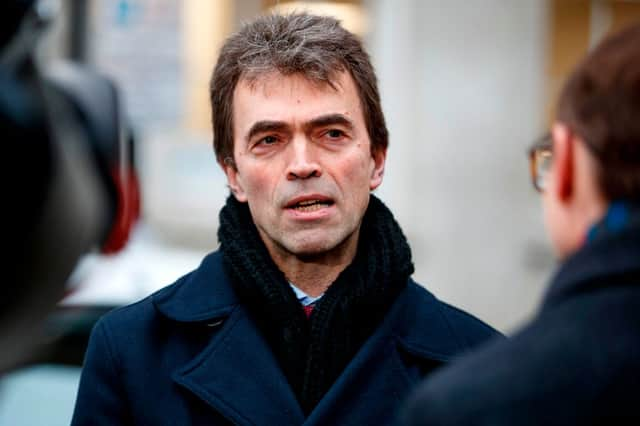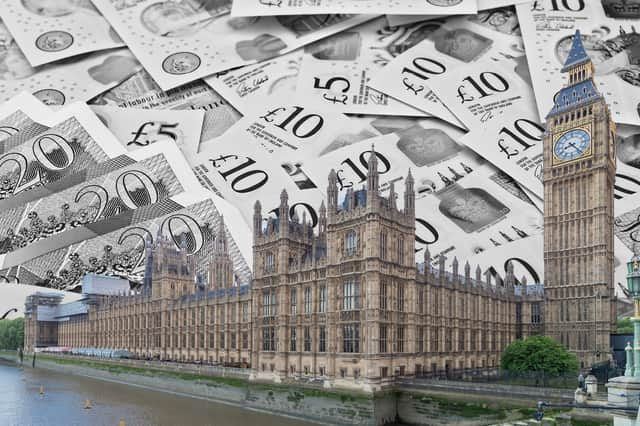Government criticised for quietly hiking the threshold on anonymous political donations by almost 50%
and live on Freeview channel 276
Transparency organisations have criticised the government for increasing the spending limit for anonymous party donations, saying voters “want to be certain that money isn’t buying political influence”.
From 1 January, the threshold for reporting individual donations to the Electoral Commission will increase by almost 50% - from £7,500 to £11,180. Donations above that limit get published on the Commission’s website.
Advertisement
Hide AdAdvertisement
Hide AdThe new rules were passed by a statutory instrument, which is used to amend existing legislation, so the changes did not get full Parliamentary scrutiny. In a written statement, Parliamentary Under-Secretary for Levelling Up Jacob Young explained that the government wanted to uprate the candidate spending limits and donation thresholds “to reflect historic inflation in the years since the respective limits were set”.
He said: “The lack of change in absolute terms impacts campaigning ability, given the increased costs of printing, postage and communication, which is vital for parties and candidates to engage with voters. For example, a second-class stamp cost 19p in 2000; it is 75p today.”
However campaigners have questioned why the donation thresholds also needed to be increased. Former Liberal Democrat MP Tom Brake, who now runs Unlock Democracy, said: “Reducing the transparency around political donations is a mistake. There was no need or justification for increasing the threshold for anonymous donations to £11,180.
“The public wants to know, and are entitled to know, who the big donors are because they are worried that these donors have far more sway over politicians than the average person. Voters want to be certain that money isn't buying political influence.” Unlock Democracy declares any donation above £5,000, as recommended by OpenDemocracy’s Who Funds You, Brake added.


Advertisement
Hide AdAdvertisement
Hide AdWhile Dr Jess Garland, of the Electoral Reform Society, said due to the UK’s first past the post voting system, anonymous donations could easily be targeted at swing seats. She said: “The decision to revise financial limits without dealing with the loopholes in party financing shows we are moving in the wrong direction and allowing more unaccountable funds into our politics.
“The public are already concerned about transparency in political donations, and it is not the electorate who will benefit from these new measures … we need a level playing field on party finance and in our electoral system.”
Steve Goodrich, head of research and investigations at Transparency International UK, added: “Step by step, the party in government is loosening controls on money in politics that are meant to protect our democracy and prevent corruption. These changes simultaneously make it easier for ever larger amounts of money to flow into Westminster while reducing transparency over where much of it comes from.


“Whilst a lack of consensus is typically blamed for not taking serious action to limit the role of big money in politics, these reforms are being made without consultation or any attempt at cross-party agreement. Only when politicians address their dependency on wealthy donors will they be free to ensure democracy works for everyone and not just those with the deepest pockets.”
Advertisement
Hide AdAdvertisement
Hide AdWhile investigative journalist Peter Geoghegan, who runs the Substack Democracy for Sale, pointed out that Richard Desmond paid just £12,000 to sit next to then Housing Minister Robert Jenrick at a fundraising dinner, and lobby him over a planning decision.
Young added that "the principle of a threshold for publishing donations" was for the "need to balance privacy and transparency". He said: "The purpose of these reporting thresholds is to provide transparency around the granting of larger donations, balanced with the administrative burden such reporting may create for the recipient and with the privacy of smaller donors. Uprating these thresholds will ensure that balance is maintained in line with the original policy and legislative intent of Parliament when setting the thresholds. Again, there is no change in real terms."
More money than ever is being donated to parties on both sides of the house. NationalWorld previously revealed how Liz Truss received over £420,000 worth of donations to fund her campaign for the Conservative leadership campaign, but the details of these were only made public after she became Prime Minister.
More than half of the total amount came from just five individual donors, including the wife of a former BP executive and the wife of a prominent hedge fund manager with interests in the healthcare sector.
Advertisement
Hide AdAdvertisement
Hide AdAnd before he resigned as an MP, Boris Johnson received a donation of £1million from cryptocurrency investor Christopher Harborne. Harborne had links with a crypto lobbying firm that had a meeting with ministers in the final weeks of Johnson’s premiership, NationalWorld previously revealed.
The Labour Party took in more donations from private companies and individuals than trade unions last year, new analysis by NationalWorld showed. These include large donations from a renewables firm and several peers with significant business interests, while a number of major consulting firms have provided the party with staff, either indirectly or through secondments.
Ralph Blackburn is NationalWorld’s politics editor based in Westminster, where he gets special access to Parliament, MPs and government briefings. If you liked this article you can follow Ralph on X (Twitter) here and sign up to his free weekly newsletter Politics Uncovered, which brings you the latest analysis and gossip from Westminster every Sunday morning.
Comment Guidelines
National World encourages reader discussion on our stories. User feedback, insights and back-and-forth exchanges add a rich layer of context to reporting. Please review our Community Guidelines before commenting.
